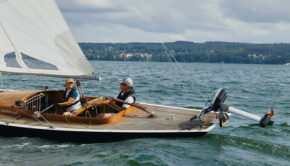With Age Comes Wisdom
Published on December 17th, 2018
Scuttlebutt encourages commentary from our readers, and while we may not at that time be able to include them all in the publication, we hold on to some in hopes we can. Frequent contributor Donald Street, Jr. shares his immense experience with surveys and surveyors:
I have been in the marine insurance business for 55 years. The first five years was working with US underwriters with the last fifty years placing insurance with Lloyd’s underwriters through a London broker.
Since the underwriters always wanted to see a copy of a recent survey before they would quote, I have read well over a thousand surveys in the last half century. The surveys have been a combination of US and British, with a few other nationalities occasionally thrown in.
It has been interesting to see the difference between the British and US survey reports.
The British survey reports are usually relatively short, giving a good description of the boat and its equipment. Information about the general condition would be followed by recommendations that should be done. On the list would be essential recommendations and then general recommendations.
In contrast, American survey reports are generally long, with detailed listing of all equipment on board, age and serial numbers. This is seldom of interest to the underwriter, but in the late 70s and early 80s the above list became useful a number of times when chartered bareboats were stolen. Since they were a standard stock boat, having the equipment numbers against the survey report proved to be vital in identifying the stolen boat.
I regularly pointed out to surveyors how the underwriters did not have time to read through ten or more pages of the survey report. The underwriter wanted to basically see on the first page a description of boat, dimension, builder, designer, etc., and then wanted to go to the last page of the report to see the recommendation list.
Needless to say, if the recommendations are serious it would be insisted that the essential recommendations be done before attachment, (coverage), while other recommendations might have notes to be done within a certain time period.
The underwriter would then complete the quote, but would expect the broker (me) to stay on top of the situation and send on to them a report by the surveyor confirming the recommendations had actually been done.
In the early 70s, I realized that boats would arrive in the Caribbean with a clean survey but since at that time the infrastructure to support the marine industry was still in its infancy, boats would frequently be breaking down, causing claims because they had not been maintained.
Thus I urged through the underwriters my Lloyd’s broker was using that the underwriters require that all boats in the Caribbean be re-surveyed every three year and the surveyor’s essential recommendations be complied with before renewal. This became pretty much a standard Lloyd’s practice until the early years of this century when Lloyd’s was reorganized.
The old individual syndicates where the underwriters had unlimited liability to the point that if the underwrite made bad guesses, they could lose everything – house, clothes – but would be allowed to keep a toothbrush. Lloyd’s has now been reorganized, syndicates are corporations with massive assets, and everything has changed.
Regarding surveyors, all the really good ones agree that by the time a person has been in the marine industry and has practiced as a surveyor, by the time they are really good, it is coming up to retirement age.
Thus I recommend when looking for a surveyor, find one who has been in the marine business for at least thirty years. Also, find a surveyor who has experience at surveying the type of boat you are buying or insuring. A 50 year old surveyor will be very experienced at surveying fiberglass boats but will probably not have much experience at surveying your old wood classic.
For the old wood classic, there are excellent surveyors who pretty much specialize in that type of boat. Some may be old, other absolutely ancient but know their wooden boats. Likewise for steel and aluminum boats, secure a surveyor that specializes in that type of boat.
Spending time finding a good surveyor who specialized in your type of boat, is time well spent and his bill will be well earned.
We encourage Scuttlebutt readers to submit stories, letters, or feedback to the editor. Please send to editor@sailingscuttlebutt.com.









 We’ll keep your information safe.
We’ll keep your information safe.